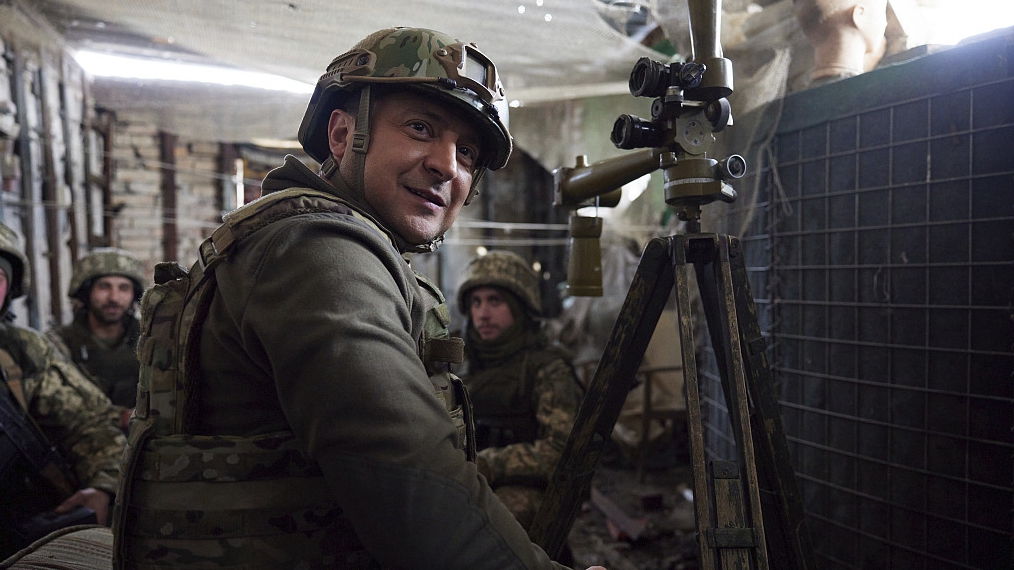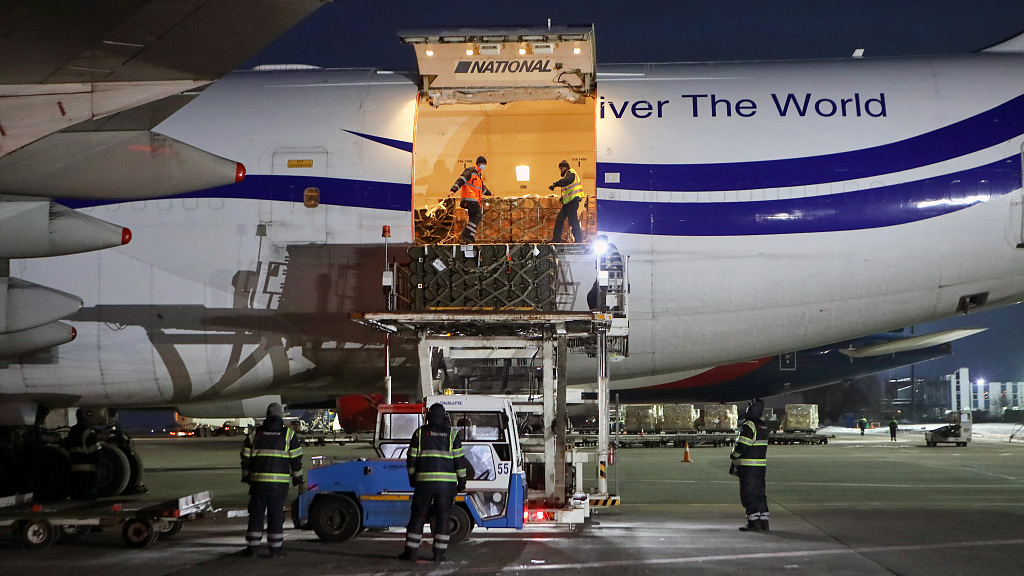
In this handout photo provided by the Ukrainian Presidential Press Office, Ukrainian President Volodymyr Zelenskyy pays a visit to the front line in Donetsk region, eastern Ukraine, February 17, 2022. (Photo: CFP)
Don't look now, but there may be Russians hiding in your closet. I hear President Vladimir Putin himself is in there right now…watching and waiting for just the right moment to come out and give you a good scare.
That's not the product of a scared child's wild imaginations. It's what the war hawks in Washington and their media stooges have been pushing for the last two months, as an estimated 100,000 Russian soldiers have taken up positions close to the Ukraine border.
Never mind that similar troop movements happen regularly in advance of scheduled military exercises. Never mind that 100,000 troops wouldn't be anywhere close enough to credibly invade or occupy Ukraine; it's less than a third of what the U.S. used for its catastrophic bloodbath in Iraq, a country which in 2003 had half of Ukraine's current population. Never mind the Ukrainian government's own words: "Do not believe the apocalyptic predictions." "This is panic."
Forget all that. The media has come forward with breathless prognostications for when Russian jackboots will touch down on Ukrainian soil. "They're coming soon, on January 20. No wait, during the Beijing Winter Olympics. Hold on, we have a date again, February 16!"
It brings to mind the much-anticipated Y2K disaster that wasn't, or the supposed forecasting of an apocalypse in 2012 due to the end of the Mayan calendar. Each day brings new predictions, made with absolute certainty, of an invasion that has yet to occur.
But that's to their advantage. For the U.S. press, Russia is in a perpetual state of almost-invading, a serpent coiled and ready to strike. It's their dream scenario; an endless source of fear-mongering stories about how tomorrow, next week, next month the fateful day will come.
It's a fiction that serves their interests, as well as those of the military-industrial complex and finance capital. All stand to make a pretty penny from this hyped-up standoff, whether through panicked clicks on sensationalist articles, new defense appropriations or massive usurious loans to a beleaguered economy.
The truth, one which those media outlets would never dare to admit, is this crisis is one of the U.S.' own making. Thanks to its relentless expansion of the North Atlantic Treaty Organization and the placement of thousands of troops along Russia's borders, this outcome was inevitable. NATO's establishment in 1949 was sold as a defensive bulwark against the creeping "threat" of communism as personified in the Soviet Union. In reality, it was a means of guaranteeing U.S. influence over member states through military power and a massive nuclear arsenal. Skepticism about the alliance, which ebbed and flowed during the Cold War, was all but confirmed after the end of the Soviet Union, as NATO did not disband and instead took on a greater role in policing activities of member and non-member states alike.
A pledge to Russia not to expand eastward in deference to its security concerns was abandoned flagrantly and repeatedly, as the Czech Republic, Poland, Hungary, the Baltic states and several other Central and Eastern European states joined in direct defiance of Russian objections. The slow, steady encroachment of foreign troops would be seen as provocative by any country; much less one which had already received promises such a thing would never happen. Imagine the headlines if the roles were reversed and Russia were moving forces through Mexico to the U.S. border.

A batch of military aid from the U.S. is unloaded at Boryspil International Airport, Kiev Region, northern Ukraine, January 25, 2022. (Photo: CFP)
But a scare like this isn't a one-dimensional flexing of the U.S. government and media's ability to manufacture a narrative, nor is it strictly a ploy to flood Ukraine with armaments and predatory lending. It's both those things, of course, but also a means of disciplining allies by reminding them exactly where their bread is buttered. Countries that were previously hesitant to disrupt economic ties with Russia are being strong-armed into taking sides lest they lose patronage from the biggest economy - and army - in the world.
Perhaps the best example of this is Germany, where as with many other European countries Russia is a key source of energy. The building of the Nord Stream 2 natural gas pipeline between Germany and Russia, for instance, has been fraught with tension for years. Countless attempts to halt construction were made by the U.S., as the new pipeline would freeze out its multinational energy goliaths from a lucrative source of revenue.
Nord Stream 2 is unlikely to be stopped at this late date, but an atmosphere of heightened fear and suspicion has created a chilling effect around any business with Russia, oh-so-conveniently buying U.S. companies time to shore up credibility in Europe as an alternative source of natural gas. Even after Putin held talks with German Chancellor Olaf Scholz and both reaffirmed the need for a diplomatic solution, the U.S. remained unmoved, as if everyone in the State Department had suddenly gone deaf. Peace, after all, isn't profitable in financial or geopolitical terms.
Like so many of these media creations, the forever-imminent threat of invasion is utterly non-falsifiable. Any action or inaction can be transmogrified into a smoking gun, the final piece of evidence an attack is just around the corner. This has even happened in defiance of all recognizable logic. Most notably, when Russia moved troops away from the border earlier this week, the U.S. asserted the move was just a feint to make the world think there was a withdrawal. De-escalation equals escalation, so back on the merry-go-round we go.
If this deliberate ramping up of hostilities results in actual conflict, then of course those responsible will make it out to be a product of inexplicable "Russian aggression." And if in the future the Biden administration and its lackeys in the media abandon their war fever, this will be treated as proof the U.S. averted cataclysm through "tough negotiation."
There is no scenario in which the U.S. can't claim responsibility for a positive outcome or blame Russia for a negative one. It's smart strategy - so long as you're callous enough to treat human beings like pawns on a chessboard.


